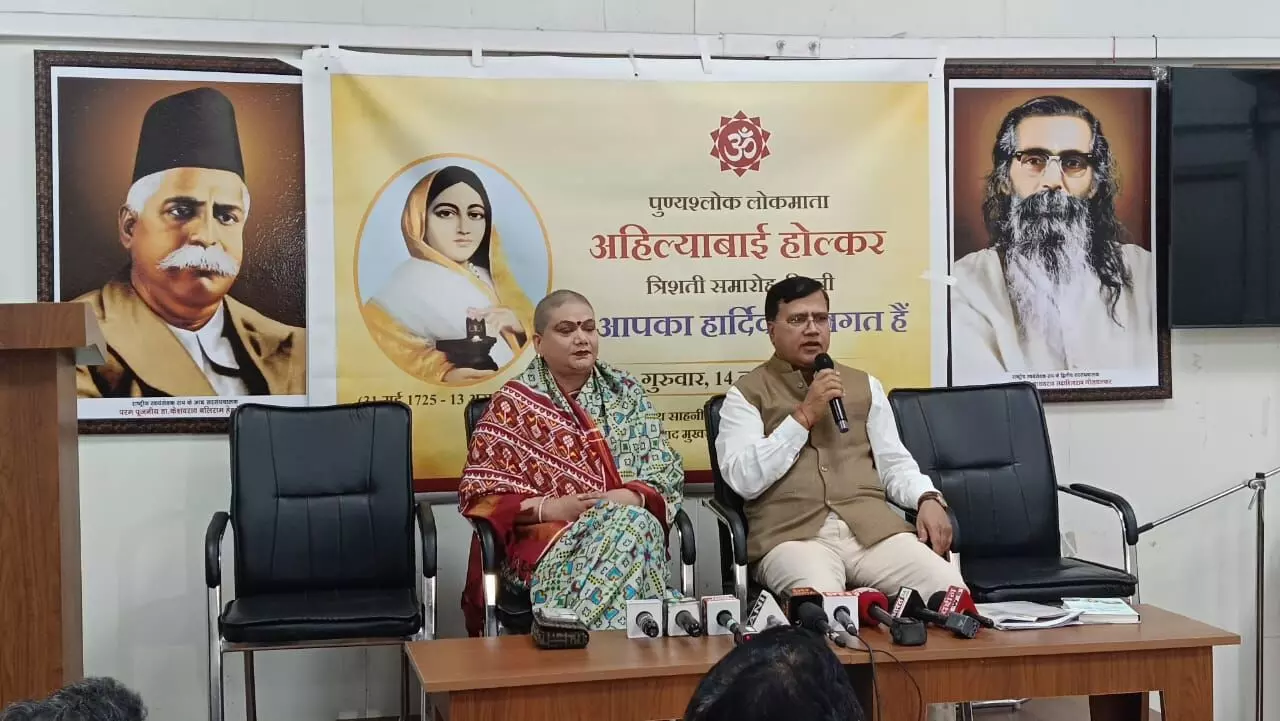Lokmata Ahilyabai Holkar is the shining star of the dignified tradition of Indian women

The 300th birth anniversary of Lokmata Ahilyabai Holkar has started from May 31, 2024. His life is a golden festival of Indian history. Her life journey from a girl from an ordinary family with a rural background to an extraordinary ruler is still a great source of inspiration. She was a unique example of hard work, simplicity, dedication to religion, administrative efficiency, foresight and bright character. The only true tribute to him would be to move forward on the path of simplicity, character, religiousness and national self-respect shown by him.
On the auspicious occasion of the 300th year of the birth anniversary of Punyashlok Devi Ahilyabai, a program will be organized by Punyashlok Lokmata Ahilyabai Holkar Trishati Samaroh Samiti, Delhi, formed to pay homage to her with reverence and to spread her inspirational work to the present and future generations, on 14 November 2024 in New Delhi. is being organized.
In this regard, a press conference was organized in New Delhi on Tuesday 12 November 2024. This press conference was addressed by Dr. Upasana Arora ji, President of Punyashlok Lokmata Ahilyabai Holkar Trishati Samaroh Samiti, Delhi (Managing Director - Yashoda Super Specialty Hospital) and the committee's secretary Dr. Ashok Kumar Tyagi (former Deputy Education Director, Delhi) addressed the gathering.
He said that Lokmata Ahilyabai Holkar is the shining star of the dignified tradition of Indian women. Since the ancient times, women and men have been treated equally in India. It is considered to be a manifestation of divine power. Lokmata Ahilyabai Holkar was a great ruler of India, who is known for her love of justice, efficient administration and works done for the revival of Sanatan. She was born on 31 May 1725 in Chaundi, Maharashtra. She was the daughter of her husband and father-in-law Malharrao Holkar. After his death, Ahilyabai took over the throne of Malwa in 1767. During her rule, she strengthened the judicial and administrative systems, which brought peace and prosperity to her kingdom. The reforms she introduced included tax relief for farmers, water management, grain storage and better farming system were some of the schemes that raised the standard of living of the people. For women's welfare, he gave widows rights over their property and promoted female literacy. Bhils and Gonds were exiled from the society. The community was connected to the mainstream and arrangements for their livelihood were also made. Apart from this, to encourage skill development, Lokmata invited weavers from Mandu and Surat and settled them in Maheshwar and also started the Maheshwari Silk Industry. Lokmata Ahilyabai Holkar accomplished important tasks of revival of Sanatan and cultural renaissance in the country which was affected by foreign invasions. She did construction and reconstruction work at religious places like Kashi Vishwanath, Somnath, Ayodhya, Omkareshwar, Trimbakeshwar and Mathura, which Even today, it is a centre of faith. Apart from this, roads, wells, ghats and dharamshalas were constructed for the pilgrims and arrangements were made for Annakshetra and Danshalas. This work was completed by Queen Ahilyabai, the protector of the Hindu religion and a great devotee of Shiva, under her able leadership. And she is a symbol of farsightedness. Due to her humane policies and popular rule, she received the status of Lokmata. The thirty-year reign of Lokmata Ahilyabai Holkar is seen as the golden period of Malwa province. Indore, ruled by her, is still the capital of India. It is one of the most developed cities of India. The charitable work done by him on one hand preserves Sanatan and on the other hand also lays the foundation of cultural nationalism in modern India. The fame of Lokmata Ahilyabai Holkar, inherent in these unprecedented contributions, will always resonate in India.
